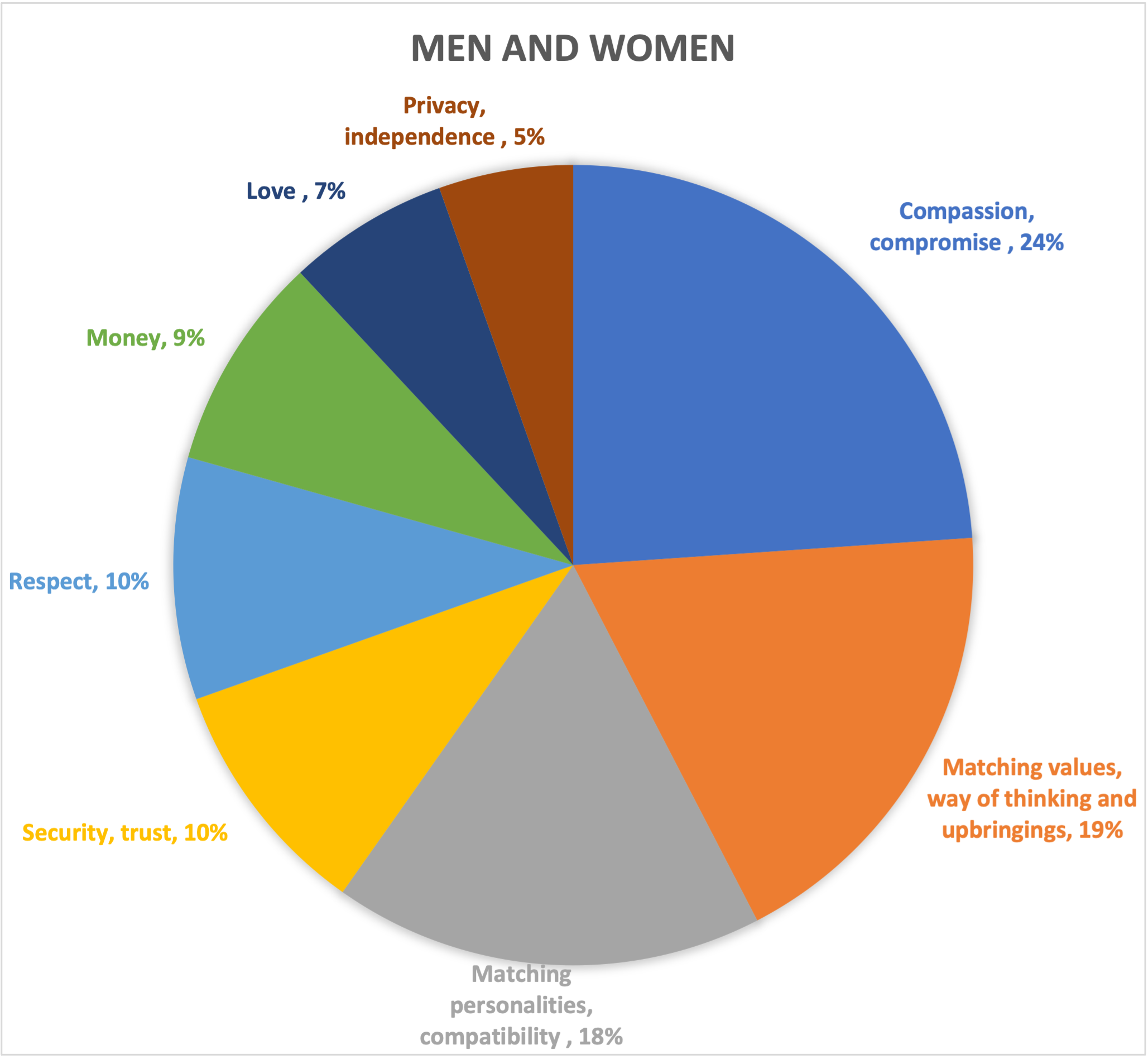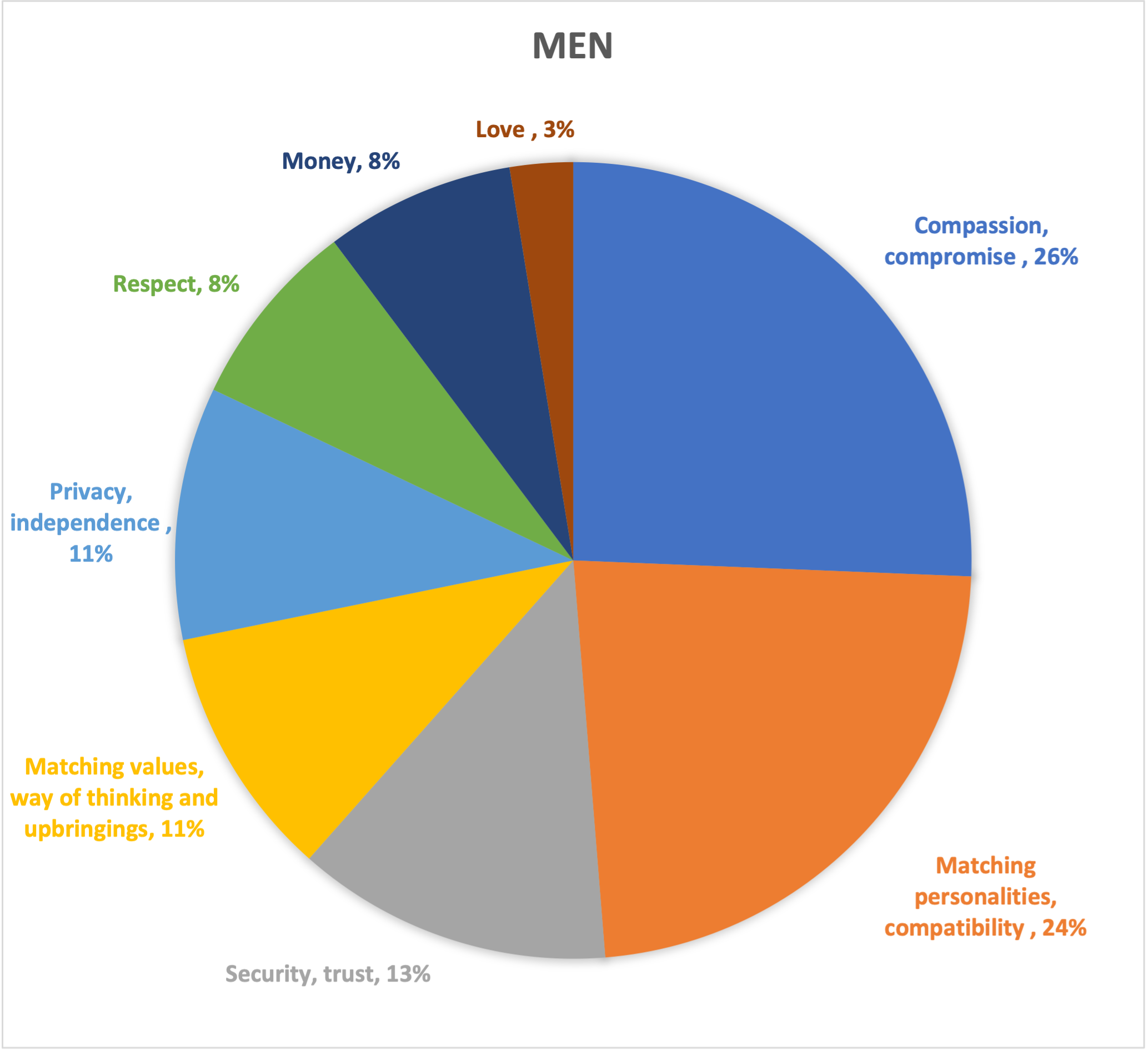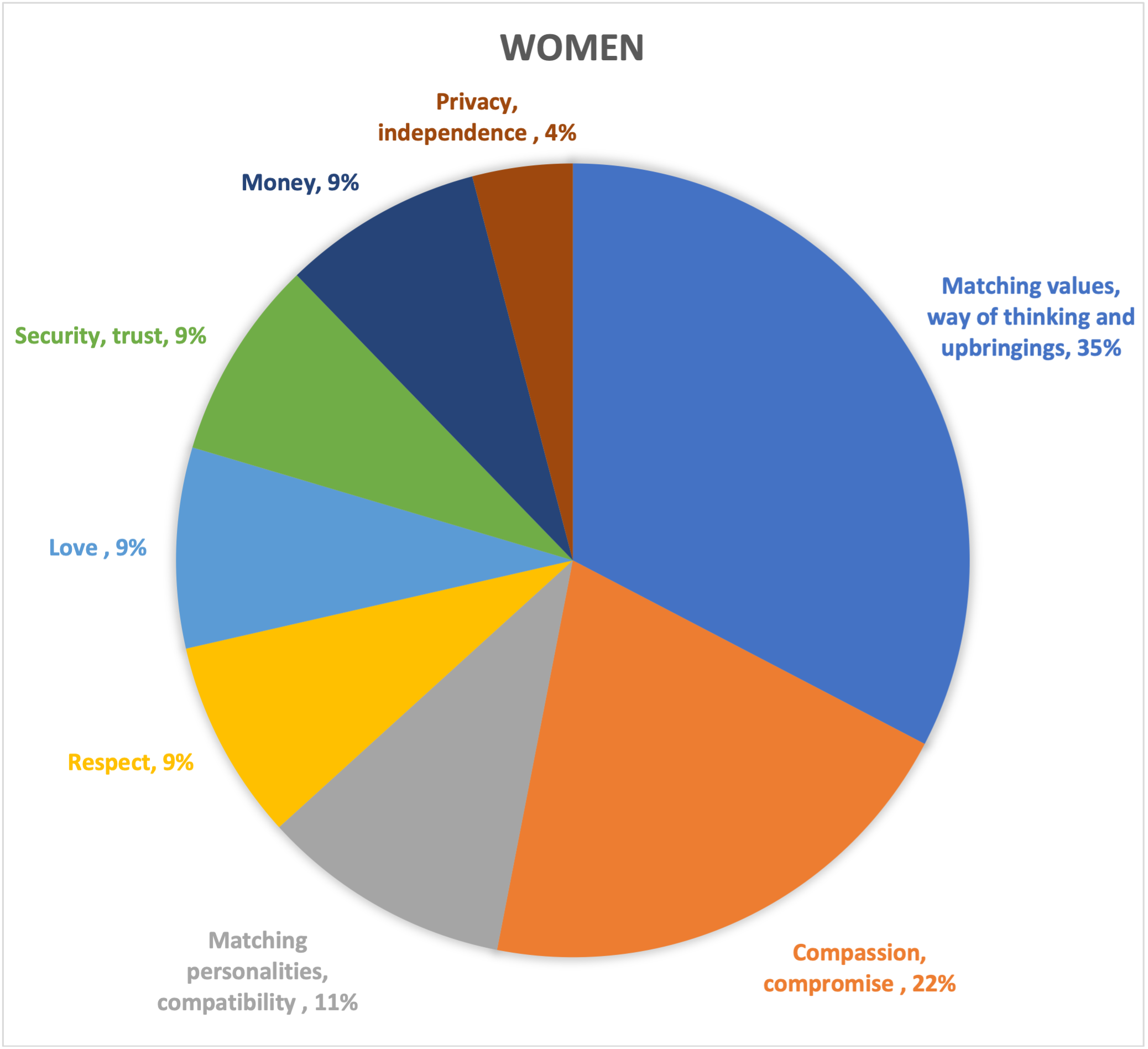Beyond Love: A Survey Reveals the Most Important Things in Japanese Marriages

According to a recent survey conducted by Ringi, love is not the only factor that is important in a successful marriage. A group of 46 married men and 54 married women of Japanese nationality, aged 30 to 55 years, were asked to share their thoughts on what they believed was the most important thing in marriage, and a wide range of responses were received. In this article, we will explore the top themes that emerged from these responses and provide insight into what Japanese married couples believe is essential for a happy and fulfilling marriage.
The responses were also compiled into several aspect and shown in pie chart, which clearly shows the proportions of respondents who cited each factor as the most important in marriage. By looking at the size of each slice, it is easy to see which factors were cited most frequently by respondents.

#1. Compassion, compromise
One of the most highly ranked factors in Japanese marriages is the ability to show compassion, and compromise with one's partner. This includes being able to put oneself in the other person's shoes and making an effort to understand and support them.
“Both parties should be able to make compromises to the other. Without that, I don't think it will last long.” | (Woman, 52 years old, no children)
“To be able to talk openly with your partner on a regular basis about any issue.” | (Man, 41 years old, has children)
“Compassion. There are many things that you can overcome if you have compassion for each other and a desire to be there for each other.” | (woman, 49 years old, no children)
“Compassion for the partner. Because compassion will be returned by the partner.” | (Woman, 48 years old, no children)
“Being able to talk and understand each other.” | (Man, 53 years old, has children)
“Mutual compassion and non-interference.” | (Woman, 53 years old, has children)
#2. Matching values, way of thinking or upbringings
Another important factor in Japanese marriages is having similar values, ways of thinking, or upbringings. This can help to create a strong foundation for the relationship and ensure that both partners are on the same page when it comes to important things.
“I believe that upbringing is important. When people are brought up in different environments, their ways of thinking do not match up.” | (Woman, 50 years old, has children)
“Values and ways of thinking are not always the same, but there are fewer fights and conflicts if the direction of thinking is similar.” | (Woman, 44 years old, has children)
“Values must match, otherwise fighting will keep ensuing.” | Woman, 44 years old, no children)
“Whether the upbringing is similar.” | (Woman, 41 years old, has children)
“Values. I think the emperor mentioned this when he got married, and from my own experience, I feel that values are the most important thing. I believe that values mean all things, such as what is considered important and what is prioritized.” | (Woman, 51 years old, no children)
“Matching values. It is important for living together.” | (Woman, 50 years old, no children)
“Some alignment of perspectives.” | (Man, 49 years old, has children)
#3. Matching personalities, compatibility
Matching personalities and being compatible with one's partner is also seen as important in Japanese marriages. This includes being able to enjoy each other's company and having similar interests and hobbies.
“Compatibility in many ways (aspects). Because I feel that this will determine whether the home will be a place where I can feel at ease or not.” | (Man, 52 years old, has children)
“Personality. If you don't match, you can't make it.” | (Man, 48 years old, has children)
#4. Security, trust. And Respect
Security and trust are also crucial in Japanese marriages. This includes being able to rely on one's partner and knowing that they will be there for them through thick and thin. Respect for one's partner is also important, as it helps to create a healthy and positive relationship dynamic.
“I think it is an attitude of respect for the other person. I am not respected, and I feel that is the most important thing.” | (Woman, 49 years old, has children)
“A feeling of security. Because I am happier when I can be with someone who makes me feel at ease.” | (Woman, 31 years old, no children)
“Respect for the other person. Because there will be frayed edges sooner or later.” | (Man, 45 years old, no children)
“Trust. Because I don't feel comfortable with someone I don't trust.” | (Woman, 39 years old, no children)
“A sense of security. Because we'll be together for a long time.” | (Man, 52 years old, has children)
“Mutual respect. We will always have differences of opinion when we live together.” | (Woman, 51 years old, has children)
“Being a safe and comfortable partner.” | (Woman, 50 years old, no children)
#5. Money
Money may not be the most romantic factor, but it is still seen as important in Japanese marriages. This includes being financially stable and being able to provide for one's family.
“Financial Strength. Without money you can't do anything.” | (Woman, 51 years old, has children)
“Money. If money is tight, relationships are tight.” | (Man, 55 years old, has children)
“Financial capability.” | (Woman, 49 years old, no children)
#6. Love
While it may not be the most important factor, love is still seen as important in Japanese marriages. This includes feeling affection and admiration for one's partner and wanting to spend one's life with them.
“If you are caring for each other and keep that feeling, you can stay close.” | (Woman, 55 years old, has children)
“Love” | (Man, 47 years old, has children)
#7. Privacy, independence
Privacy and independence are also important in Japanese marriages. This includes being able to have personal space and time to oneself, as well as being able to pursue one's own interests and goals.
“Ensuring private time.” | (Man, 41 years old, has children)
“A certain amount of space is needed between each other.” | (Woman, 50 years old, has children)
More responses
According to some respondents, the most important thing in marriage is not only one factor, but rather a combination of various elements. In addition, for some respondents having children and building a family, as well as maintaining positive relationships with spouse's parents, and common interests are most important factors in a marriage.
“To create a happy home with children. It makes life worth living.” | (Man, 55 years old, has children)
“We must take care of each other in our lives. Marriage involves relationships with each other's families, so if you don't take care of each other, you will be stressed, and it will not go well.” | (Woman, 48 years old, has children)
“I think there is more than one most important thing. Love is the most important, but you also need to be financially strong enough to make a living, and I think fidelity is also important. When I was young, I used to say that if you have love, you don't need money... but now I don't think it is enough to lead a peaceful life.” | (Woman, 54 years old, no children)
“Respect and understanding of the other person's feelings.” | (Man, 55 years old, no children)
“Personalities and values must match. If they don't match, it will be difficult to be together.” | (Woman, 48 years old, no children)
“The personalities must match, we must be able to be considerate of each other, and have some income. If the personalities don't match, there will be a lot of fighting, and you will likely forget how to be considerate. Also, I think there is a certain number of things that money can't solve, but there are things that money can solve (for example, outsourcing housework), so if you can afford it, it will give you more room in your heart to be considerate of your partner.” | (Woman, 47 years old, no children)
“Compatibility. I think that's the only way to go. Patience as the next best thing. I think it will become more essential as time goes on.” | (Man, 53 years old, has children)
“Financial strength and consideration. It's important to have a foundation in life and a willingness to listen to your partner.” | (Man, 55 years old, has children)
“Having something you enjoy doing together.” | (Man, 41 years old, has children)
“Matching values with the partner and keeping some distance from the partner's family” | (Woman, 45 years old, has children)
What is the most important thing in marriage for each gender
If looking at the results for each gender, the most important thing in marriage varies between men and women.
For women, the most important thing in marriage is “Matching values, way of thinking or upbringings”, with 35% of respondents citing it as the most important factor. This was followed by “Compassion, compromise”, which 22% of respondents cited as the most important thing in marriage. Other factors that ranked highly among women included “Matching personalities, compatibility” (11%), “Security, trust” (9%), “Respect” (9%), and “Love” (9%).
For men, the most important thing in marriage also “Compassion, compromise”, with 26% of respondents citing it as the most important factor. This was followed by “Matching personalities, compatibility”, with 24% of respondents citing it as the most important thing in marriage. Other factors that ranked highly among men included “Security, trust” (13%), “Respect” (8%), “Matching values, way of thinking or upbringings” (11%), and “Privacy, independence” (11%). Interestingly, “Love” ranked lowest among men, with only 3% of respondents citing it as the most important thing in marriage.


Last words from Ringi
According to a recent survey, top two important things in marriage for Japanese women and men are “Compassion, compromise” and “Matching values, way of thinking or upbringings”.
Compassion and compromise are skills that can be learned and developed. These skills are important in any relationships. Marriage involves two people coming together and learning to navigate their differences, and compassion and compromise can help to create a sense of understanding and cooperation. It is possible for married couples to learn and practice these skills in order to improve their relationship and increase their sense of connection and happiness. It may take time and effort to develop these skills, but with patience and practice, it is possible to create a more harmonious and fulfilling relationship.
One way to keep up on working on relationships is using technology solutions that make the things even convenient. The Ringi app is driven by AI and designed to support couples communicate more effectively and maintain their relationships. By using Ringi, couples can gain insights into their own communication styles and learn new ways to express themselves and understand each other. With some effort and the right tools, couples can strengthen their bond and keep their relationship going strong.
Why not upgrade your relationship with Ringi, an AI app for couples?
Ringi blog writers:
- Yerkezhan Karatayeva
- Minae Yonemura